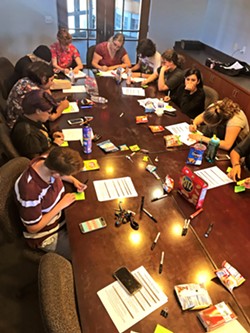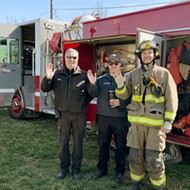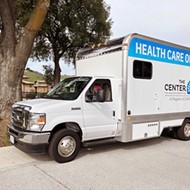COVID-19 forced CAPSLO's Teen Monologues project to transition from theater to podcast for the first time ever
By Kasey Bubnash[{
"name": "Newsletter Promo",
"id": "NewsletterPromo",
"class": "inlineCenter",
"insertPoint": "4",
"component": "15264767",
"requiredCountToDisplay": "0"
},{
"name": "Ad - Medium Rectangle CC01 - 300x250",
"id": "AdMediumRectangleCC01300x250",
"class": "inlineCenter",
"insertPoint": "8",
"component": "2963441",
"requiredCountToDisplay": "12"
},{
"name": "Ad - Medium Rectangle LC01 - 300x250",
"id": "AdMediumRectangleCC01300x250",
"class": "inlineCenter",
"insertPoint": "18",
"component": "2963441",
"requiredCountToDisplay": "22"
},{
"name": "Ad - Medium Rectangle LC09 - 300x250",
"id": "AdMediumRectangleLC09300x250",
"class": "inlineCenter",
"insertPoint": "28",
"component": "3252660",
"requiredCountToDisplay": "32"
}]
Emma Fay has been involved with the Teen Monologues program for more than a decade, since she first discovered and joined the local theater project as a San Luis Obispo High School student in 2006. But she's never seen the program go up against the challenges it faces today.
Teen Monologues is a Community Action Partnership of SLO (CAPSLO) program aimed at elevating the voices of local youth through theater. High school kids write and edit stories based on their personal experiences with things that can be difficult to talk about—sex and peer pressure, gender identity, family issues. Then they use those stories to create a show they perform live on stage.
As a kid, Fay was inspired by the raw and relatable the stories her peers shared, and she appreciated the project's ability to touch on parts of her life as a teenager that she didn't often talk about with her family or hear about in her classes.
"You get a window into somebody else's life," Fay told New Times.
She loved the project so much that, after she graduated from college with a degree in public health, she returned to SLO County and took a job at CAPSLO, where she now oversees Teen Monologues as a teen wellness coordinator.
But now, after nearly eight years of running the project, it's facing unforeseen obstacles—from the COVID-19 pandemic, which closed schools and theaters across the nation, to budget cuts and a shift in federal funding that left CAPSLO without its usual source of money for the program.
But if there's anything she's learned from trying put on a theater performance during a pandemic marked by physical isolation, it's that her team and her students are resilient.
This school year, for the first time in history, the Teen Monologues theater performance went digital and took the form of a five-episode podcast.
"We really became podcasters without any prior experience," Fay said.
It was a last-minute pivot that Fay said her students had to make in early April, when it became clear that a performance with a live audience wouldn't be possible. Fay said her students ran through a number of other ideas first, but they decided that a podcast would reach a broader audience. And it has.
"Podcasts are so popular, and they're a medium that all age groups listen to," Fay said.
While the theater show only happens once, and its audience usually consists of students' parents and close relatives, this year's show is being streamed repeatedly throughout the community.
"So it has a lot of possibilities that a theater show doesn't have," she said.
The transition from theater to podcast didn't come without hurdles. Fay said the overall structure of the performance had to be reorganized—the theater stage manager became the host of the podcast, for example—and while some students had the technology necessary to stay involved virtually and record themselves at home, others didn't.
"I love that we did it," Fay said, "that we didn't give up."
The podcast (which you can find at capslo.org) has been so successful that Fay said CAPSLO is considering continuing that portion of the project for years to come. More importantly, she said, students like Yuleimy Sanchez still had the opportunity to share their stories.
Sanchez, who is going to be a senior at Santa Maria High School next year, joined Teen Monologues when she was a sophomore. As she got more involved in the program, she realized she has a lot in common with her peers.
"I made friends that I could keep for a long time," she told New Times, "because we understand each other."
In this year's Teen Monologues podcast, Sanchez appears in an episode about family. In her monologue, Sanchez illustrated a fight that her parents had and the responsibility she feels to take care of her parents and her younger siblings. She often takes on too much, and then bottles her own emotions up.
But through Teen Monologues, she's been able to address that.
"By doing the monologue, it was a way for me to talk about it," Sanchez said. "Open up little by little."
Fast fact
• Arroyo Grande resident Noah Kolkailah was recognized by the U.S. Congress on July 22 as one of this year's Congressional Women of the Year. Kolkailah is principal and director of Olive Grove Charter School in San Luis Obispo, and founded the Peace Academy of the Sciences and Arts, a summer program focused on social justice and environmental awareness for kids ages 6 to 11. She also helped start the Muslim Student Association at Cal Poly. Δ
Staff Writer Kasey Bubnash wrote this week's Strokes and Plugs. Send tidbits to [email protected].










